- Home
- Jay Bonansinga
Search and Destroy Page 7
Search and Destroy Read online
Page 7
Lilly pulls a bowie knife from her belt and dives into the mire.
Something moves beneath one of the horses, something dark and slimy and dead. The horse rears and squeals. Something below the surface latches on to it and digs into its midsection, causing the animal to let out a horrifying caterwaul of agony. In the sunlight, the iridescent surface of the marsh darkens with the horse’s blood. The animal twists and writhes, its muzzle lifting to the heavens in its death throes, the blood bubbling up from its craw, choking it, taking it down into the dark rheumy silt below. The animal sinks out of sight, the bubbles spreading across the scummy surface of the marsh as dark shapes move below.
Lilly swims to the log and grabs hold, gasping for breath, her grip unsteady on the slimy timber. She tries to get air in her lungs. She starts to slide off. She drops the knife and hugs the log. The sunlight blinds her. She can barely see Jinx and Miles out of the corner of her eye, each of them clinging to the log. The stench fills Lilly’s senses, an indescribable mélange of methane, rotting flesh, coppery blood, and grassy swamp gases.
Another horse shrieks in agony twenty feet away, the swamp filled with the dead, the muck turning dark crimson red with the profusion of blood now infusing the marsh, warming the pocket of water around Lilly’s legs, causing Lilly to get dizzy with terror. She can barely see now. Out of ammo. No knife. Shivering. Hypothermia coming on. A dark shape moving beneath her. She can hardly breathe or see with the sun and tears in her eyes. How did this happen? The log shifts in the water, begins to sink.
Lilly can barely see the blurry shapes of Jinx and Miles holding on to the opposite end of the sinking log, gasping for breath, trying to kick at the dark moving shapes beneath them. Only three horses remain, each one hyperventilating, the sound of their breaths like heartbeats fading, slowing, dying. Lilly tries to think. Her brain has seized up. Nothing on her mind screen now but dark red covering everything, pulling down a shade over her consciousness. The log sinks below the surface. Lilly feels the clammy cold swamp water rising up over her chin and mouth and nose. Her strength gone, her mind blank, she hears a strange noise right before the surface of the marsh rises over her ears.
“HOLY FUCKING SHIT!!—HOW DID THIS HAPPEN?!”
A ghostly disembodied voice echoes in her ears as if in a dream.
Lilly sinks below the surface.
“JACK! TAKE THOSE FLESH EATERS OUT WHILE I GRAB A FUCKING ROPE!!”
The voice goes all muffled, watery, and dreamy as Lilly sinks, blinking languidly and gazing through the rheumy green soup of the swamp. The thick stew of underwater weeds, floating detritus, and strands of unidentified organic tissue drifting aimlessly practically glows in the radiant ribbons of early-morning sun, which now penetrate the water. Lilly can see dead people walking across the silt directly below her like citizens traversing the alien streets of a necropolis.
All at once, a series of blasts as brilliant and sudden as lightning bolts pierces the marshy atmosphere, tracer bullets threading through the water, canting directly down toward the dead people. The blasts take each walker in a slow-motion ballet macabre—heads snapping forward, clouds of darker fluid pluming out, shoulders hunching as bullets exit and drill into the silt floor in little puffs of darker muck.
Somewhere in the deepest recesses of Lilly’s mind, a clarion bell sounds. She kicks and flails and swims back up toward the surface with every last shred of strength she can muster, her lungs catching fire, her oxygen-starved brain turning everything around her into streaks of purple, magenta, and red-tinged neon light. She nearly doesn’t make it—her body starts to shut down one nanosecond before she surfaces with an enormous, heaving gasp.
“There she is!”
Things are happening too quickly for Lilly to lock on to any one thing. A length of thick, heavy-duty rope splashes in the water only inches away from her. She grabs hold of it. Another volley of gunfire pierces the air. In her bleary vision, Lilly can see silhouettes of figures gathered along the edge of the marsh in front of her, some of them on horseback, others aiming high-powered rifles at the dead things polluting the swamp. Lilly catches glimpses of Jinx and Miles and the three surviving horses being hauled out of the water, and she hears a familiar female voice.
“Thank God we came along when we did!”
Moving with the drunken slowness of a stroke victim, Lilly winds the rope around her hand and forearm, and then feels the tug as they pull her toward dry land. She crawls with agonizing sluggishness out of the water and then collapses into a fetal position, taking great lungfuls of air. She rolls onto her back.
A woman stands over her, smiling down at her while holding an AR-15 on her hip. Tall, sinewy, hair pulled back in a tight ponytail, the woman wears a tactical vest laden with mag pouches and gear over her chambray top, and has a patrician face that brings to mind summers in Hyannisport and cocktails on the veranda. “Just about lost you there, kiddo,” the woman says with a wink. “You need to be more careful—especially now.”
Lilly manages to speak in a hoarse croak. “Ash? How did you—?”
The woman—Ashley Lynn Duart—interrupts with a deferential wave of her slender hand. “Plenty of time for questions, Lilly … but not here.”
* * *
The town of Haralson—where Ash currently resides and runs things for a small, tightly knit group of twenty-two survivors—was once a sleepy little farming community on the southern edge of Coweta County. Not much more than a couple of intersecting two-lanes, a Baptist church, a coffee shop, a small grocery store, and a few modest wood-frame homes and professional buildings, the place had a pickled-in-time feel to it when Ash ended up here three years ago after escaping the walker-riddled suburbs of Atlanta. From the tin roofs of the grain elevator to the actual pickle barrels on the porch of the feed and seed store, the little hamlet looked as though it had been built by Walt Disney and art directed by Norman Rockwell. But the last few years have militarized places such as this, draining the quaint out of them, and Haralson, Georgia, is no exception. In addition to massive barricades of found materials erected around the center of town, the fifty-caliber gun placements at each corner and the proliferation of concertina wire along every fence give the place an air of martial law.
“Don’t do this,” Ash pleads with Lilly and her crew late that morning in the Haralson Baptist church rectory, her voice grave and low. “Go home.”
The large, airy room still has its stained-glass panels from before the Turn and fake plants are arrayed along the windowsills. Book-lined walls, shaded lamps, and a large conference table in the center of the room complete the picture of preplague order, gentile society, houses of worship, and a loving God. Lilly paces, chewing her fingernails, moving with a slight limp from her misadventures on the railroad. The others sit around the room in various stages of medical dressing, bandages, and Betadine swaths. Miles sits at one end of the conference table, still shivering slightly from hypothermia, a blanket wrapped around him. Jinx sits on a sill, listening as she wipes down her blades. Norma and Tommy sit side by side at the other end of the conference table, hanging on every word Ash says.
“These are serious dudes,” Ash elaborates, sitting on a padded swivel chair at the head of the room, her slender arms crossed against her flat chest. Still sporting her tac vest and tight ponytail, she’s all sharp angles and lean muscle, like a fitness instructor. “They pack major heat and they have a mission—don’t ask me what the hell it is—and they will kill you just as soon as look at you. Trust me on this.”
Lilly stops pacing and puts her hands defiantly on her hips. “All the more reason to go after them.”
“Lilly, you’re not listening. They’ve already hit every major survivor group from here to College Park—they killed five of my people. Now Moreland doesn’t answer the radio, and I’m worried that they hit Heronville as well. They’re on some kind of binge, some kind of fucked-up thrill-kill binge.”
Lilly thinks about it for a second. “I assume you talked to
Cooper?”
Ash lets out an exasperated sigh. “Radio silence.”
A thin trickle of chills passes down through Lilly’s midsection, her complex relationship with the man coloring her reaction. It’s no secret that Cooper Steeves’s faux Indiana Jones posturing gets to most people. In fact, if Lilly took a poll among the survivors, and asked to whom they would award the prize for the Most Obnoxious Douche Bag Among the Living, Cooper Steeves would win in a landslide. But Lilly has always suspected the existence of another side to Cooper, a deeper layer of humanity lurking beneath the fedora and fake bullwhip. She has always found him amusing and handy and useful in a crisis as a devil’s advocate. Sure, he’s fussy and arrogant, and maybe even a little bit narcissistic, but he’s also brilliant and well read and an independent thinker. Most importantly, he would never allow a transmission sent to his walkie-talkie to go unanswered—hell, if you got him drunk he would claim he invented the concept of walkie-talkies.
Lilly vividly recalls the day last year when Cooper Steeves introduced the idea of interconnectedness among survivor towns. He had sent a courier to Woodbury—one of his teenage charges on a swayback pony—requesting the presence of the leaders of each town along the South Central corridor. Lilly set out the next morning for Moreland. When she arrived, Cooper had gathered Ash and the others in the police station lobby for an impromptu presentation. He had a whiteboard at the front of the room and was strutting around in his bomber jacket and fedora, wielding his dry-erase marker as if it were a medieval mace. “The key to everything is communication,” he began in his stentorian voice, as pompous and pedantic as ever. Then, with a dramatic flourish that would put an infomercial pitchman to shame, he tossed a dog-eared catalog on the end table where everybody could see it. “Introducing the key to everything … right under our noses.”
Lilly remembers recognizing the old Hammacher Schlemmer catalog from the old days in Marietta when she and her father would receive the upscale knickknack catalog around Christmastime each year. Teenage Lilly loved to peruse the latest gadgets and gewgaws, the nose hair trimmers and heated full body massage chairs and rechargeable streaming video camera pens. But that day in the Moreland Police Department lobby, staring at that faded, water-stained catalog, she got what Cooper Steeves was talking about as soon as he turned to page 113 and pointed at the device circled in red at the bottom of the page. The Crank-Wound Rechargeable CB Radio Base with Three Portable Walkie-Talkies originally went for $199.99 (or four easy installments of $49.99 per month). “There’s a Hammacher Schlemmer store in the Moreland Mall on the north side of this very town,” Cooper had announced then with all the pomp and circumstance of a minister delivering the good news of the blessed savior Jesus Christ. His cleft chin had jutted with so much pride that day, Lilly thought it might pop off his face as he pontificated. “Now, I realize the place is overrun with the dead, but with the right battalion of hearty souls, we could very easily procure enough of these crank-wound radios to keep the entire network of survivor towns wired and connected for the duration.” This was how Cooper Steeves usually talked, like an evangelist teaching a class, but Lilly remembers thinking at the time what a brilliant perspective it was.
Now … nothing but radio silence.
“They took my kids, Ash.” Lilly stares at the tall woman, an unwavering gaze. Lilly’s fists clench involuntarily at her side as she paces and thinks. “I don’t fucking care what I have to do.”
“I understand that, but what I’m saying is, we barely kept them at bay with the best fortification I know of in these parts, and we drew major casualties. You’re nothing to them. No matter how motivated you are, you will not make a dent in these guys, you will not stop them.”
Lilly paces some more. “I don’t want to stop them, I don’t need to make a dent in them.” She looks at the others. “I don’t want to drag anybody into a suicide mission.” Her eyes well up. “I just want my kids back. That’s all.” She wipes a tear off her cheek. “I want my kids back.”
Ash looks down, doesn’t say anything, and the silence stretches for an interminable length of time as the others avoid eye contact with Lilly. The rays of sun through the stained glass give the room a strange, ethereal quality that seems to accentuate the stalemate. At last, Ash takes a deep breath and lets out a pained sigh. “I want to show you something. All of you. Follow me.”
* * *
The body lies in Haralson’s makeshift morgue, the holding room of a former grain elevator on Main Street. The high ceiling of cobwebbed girders and skylights combine with the corrugated tin walls to give the space an air of institutional despair, a purgatory of gurneys like a Civil War mobile hospital. Lilly stands over the last bed in a row of sheet-covered bodies, the bloodstained fabric covering the last body forming Rorshach-like patterns.
“Who am I looking at?” Lilly asks as Ash steps around to the head of the gurney. The others hang back at a respectful distance.
“He was out there in the barrens with his beloved wind machines when the kidnappers picked him off.” Ash pulls the sheet away and reveals the identity of the corpse on the metal table.
“Oh, God.” Lilly almost involuntary looks away. In the back, Norma gasps, and the others make anguished sighing noises. For a moment, Lilly looks as though she might vomit. Her voice crumbles around the words as she gazes back at the body. “Goddamn it.”
Bell’s remains are shirtless, a towel over his groin, and the body is surprisingly pristine, tranquil, and undisturbed. Although it’s never spelled out, Lilly will later deduce that Ash demanded special attention be paid to this body, and to the postmortem business of destroying the brain and preparing the cadaver for burial.
Everybody loved Bell, and Bell loved his wind farm. For the last year, in fact, he had preached the gospel of wind energy to anyone who would listen. With his ragtag crew from Moreland, he had retrieved at least a dozen of the massive windmills from various rural locations across the South, dismantling them and bringing the parts back to West Central Georgia where he lovingly rebuilt them and started his own wind farm in a meadow between two tobacco fields. Not many of the windmills worked yet, but Bell was obsessed, and he was not the only one. Homemade wind farms had been cropping up all over the place in recent months. Some survivors were even working on ways to refurbish electric cars for future use with wind-generated power. Bell was a true believer, and he could often be seen wandering the meadow among the giant shifting shadows of the turning blades like a vintner proudly strolling the length of his vineyard.
Lilly loved Bell as much as anybody else—in a platonic sense, of course—and that tormented the man. He had such a raging crush on Lilly that someone once found a notebook of Bell’s in which he had scribbled Lilly’s name, birth date, hometown, and personal data over and over—à la the scrawl of some lovelorn high school kid—as if she and he should be going to the prom together. Now, the sight of his empty shell of a body—discarded like trash, two clean entrance wounds like tiny coins above his left nipple—tortures Lilly. His boyish face and his crazy mop of hair, still wiry tendrils of flaming red, call out to her. He looks like he was merely asleep.
“They just … killed him in cold blood?” Lilly can barely form the sentence. “For no reason? Like … like some game animal they were hunting?”
“Maybe … but I don’t think so.” Ash swallows and leans down to the body. She gently lifts the left arm and rotates it slightly so that Lilly can see the tiny puncture wound in the crook between forearm and bicep—the spot where his veins still bulge. “We found him facedown in the meadow, the windmills burning. Looked like he tried to stop them. He got hit on the head first, then dragged before they shot him execution style for reasons unknown.”
“Jesus.”
Ash points at the puncture wound. “We saw this when we got him back here.”
Lilly leans in. Jinx and Miles move in closer to look over Lilly’s shoulder at the faint ringworm of a bruise around a tiny pinprick of a hole in Bell’s arm,
which is rimmed in red. Lilly tries to focus her thoughts. She wipes her eyes and says, “What is it?”
Ash shrugs, lowering the arm back to the edge of the gurney. “I’m not sure, I’m no pathologist, but that looks like a needle mark.”
“A needle mark? Are you saying Bell’s a junkie? He did this to himself?”
Ash waves the possibility off. “No, not at all. It’s too fresh.”
“So you’re saying they did this to him? These paramilitary motherfuckers, they drugged him?”
“I know it doesn’t make any sense.” Ash sighs. “Why drug a man you’re going to waste in two seconds?”
Lilly rubs her face. She looks at Jinx. “Nothing these people do makes any sense.”
Ash nods. “Agreed.” She looks at Bell’s remains. “But that doesn’t mean they’re crazy. It would be a mistake to think they’re just nuts or wasted or whatever. They’re dangerous as hell, Lilly.”
“I think we’ve established that much.” Lilly takes a deep breath as Ash gently puts the sheet back over Bell’s upper half. Lilly sighs, rubbing her eyes. She tries to gather her thoughts, tries to think of her next move. She looks at Ash. “You mind if we stay the night? Rest up? Maybe borrow a few items?”
Ash gives her a look. “You’re not going to take my advice, are you?”
Lilly looks at the others, looks at the floor. She can’t think of anything else to say.
“You’re going to keep going after these people until you find them or get yourselves killed.” Ash crosses her arms against her chest. “Do I have that about right?”
Lilly meets her gaze but says nothing.
* * *
That night, after dinner, Lilly meets with her team in the church rectory.

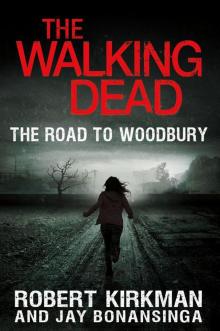 The Walking Dead: The Road to Woodbury
The Walking Dead: The Road to Woodbury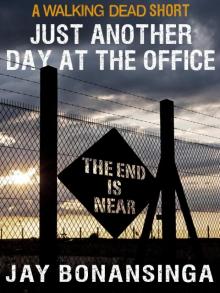 Just Another Day at the Office
Just Another Day at the Office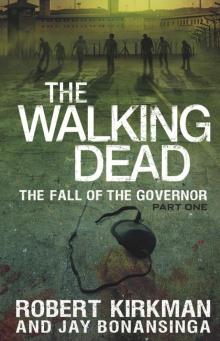 The Fall of the Governor: Part One
The Fall of the Governor: Part One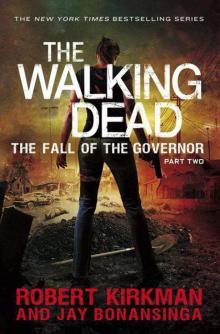 The Walking Dead: The Fall of the Governor: Part Two
The Walking Dead: The Fall of the Governor: Part Two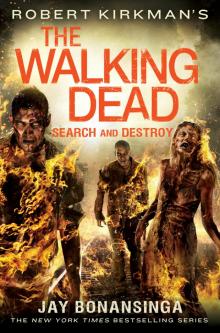 Search and Destroy
Search and Destroy Invasion
Invasion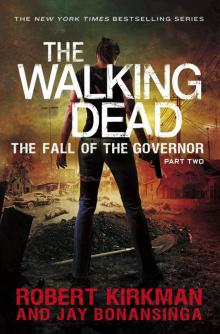 The Fall of the Governor: Part Two
The Fall of the Governor: Part Two The Walking Dead Collection
The Walking Dead Collection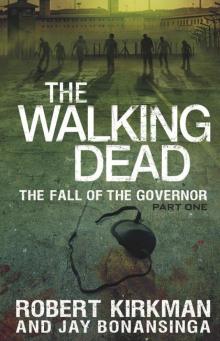 The Walking Dead
The Walking Dead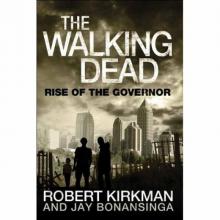 Descent
Descent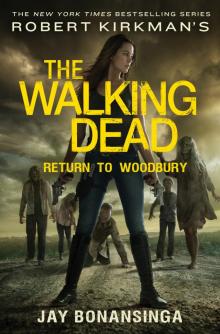 The Walking Dead: Return to Woodbury
The Walking Dead: Return to Woodbury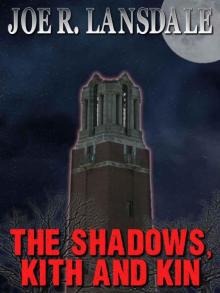 The Killer's Game
The Killer's Game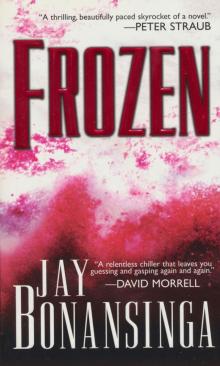 Frozen
Frozen Shattered
Shattered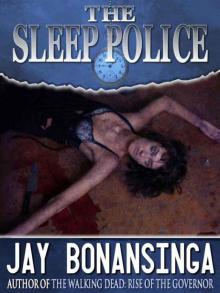 The Sleep Police
The Sleep Police Perfect Victim
Perfect Victim